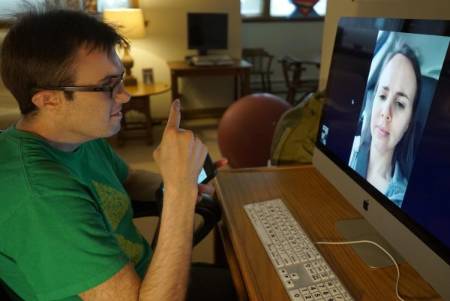Interview With A Ski-hi Alumns

which helps him read and communicate.
Blogger's note: I "met" Andy Prouty via an email interview while working on a story for Utah State Magazine about the CPD's SKI-HI Institute, and its contributions to education for deafblind children. (USU alumni, watch your mailboxes for that story in August!) Andy was born with hearing loss and very limited vision in one eye. His family came to Utah in the 1980s to take advantage of intervener services made available through SKI-HI. Interveners work one-on-one with children with impaired vision and hearing, similar to the way Anne Sullivan worked with Helen Keller. When he was three, Andy and his father testified before the Utah Legislature about the need for teachers trained to work with children who had both sight and hearing impairments. Since then, SKI-HI's mission has evolved and its influence has spread nationwide. The Prouty family has moved to other states, and now they reside in Minnesota. In this email interview, Andy reflects on those early days of his education in Utah, the higher education he is pursuing now, the technology he uses and the milestones that led to the independent life he enjoys today.
Q: What was your early schooling like? Did you spend most of your time at school, or at home? (Note: Some children with sensory impairments went--and still go--to residential programs while they are young.)
My parents knew it was important for me to have direct access to communication, so I went to schools that had programs for the Deaf. I had teachers who were either Deaf or fluent in sign language. I lived at home with my family and did not live in a dorm.
Q: Do you use technology to communicate or shop at a store? Do you have go-to gadgets?
Yes, I have different technology to allow me to communicate with people around me. At work, I use a one-on-one device called UbiDuo. This device has a pair of keyboards with screens on each. When one person types something on the first screen, the text would be instantly sent to the second screen on the keyboard. This allows me to communicate smoothly with a hearing person. In stores, I use my iPhone, mostly to ask workers to help me find what I am looking for.
Q: Tell me about your first job. How did you feel about working when it was still new to you?
When I was 16 years old, I was a dishwasher at a bakery in my community. At that time, I had a dream of becoming a baker, so thought that job would get my foot in the door. After about five years of repeated requests to work as a baker, it finally came out that the baker was illiterate and would not be able to communicate with me. I normally communicated with hearing people using a pen and pad of paper, but this person couldn’t spell or read, so that was very ironic.
Q: Tell me about your current job.
I have worked as a mail clerk for the U.S. Fish and Wildlife Service for the past 15 years. However, as people are communicating more and more through electronic means, I am not as busy as I once was. I tried out some administrative assistant duties, but my low vision made it hard for me to catch every detail necessary. Once I receive my degree, I know it will open new doors for me.
Q: What was it like to move away from home?
I had mixed feelings. I was worried that I might not have enough money, but on the other hand, I was thrilled to live on my own and can do anything I want to do! I’ve been living in my own apartment for almost 11 years. The location is perfect because I am close to restaurants, banks, stores and my favorite, Target.
Q: How do you feel about gaining a higher education?
I feel good. I am willing to take challenging classes in order to receive a BA degree in order to qualify for a better job in my current career. I am now a senior at Metro State University [in Minnesota], where I plan to finish my bachelor’s degree in 2018.
Q: What are you studying, and what are your career aspirations?
I am majoring in an individualized degree in communication and culture. Since I already have 15 years of experience in the federal government, I would like to transfer to a position like human resources, where I can use my degree.
Q: What advice would you give other young people who are deafblind, who are planning their own careers and independence?
I could suggest to young people to go to a summer transition program where they can learn and practice independent living skills, mobility skills and practice on a job before moving on into the real world.
Q: What would you like the world to know about people who are deafblind?
I would like the world to view deafblind people as equals. We might have disabilities, but we still can do everything with modern technology and services. Don’t assume that deafblind people need help without asking.

